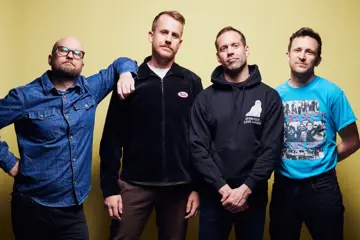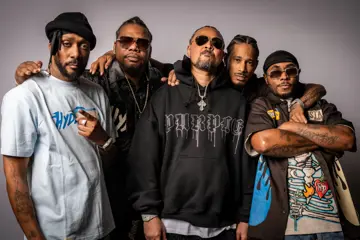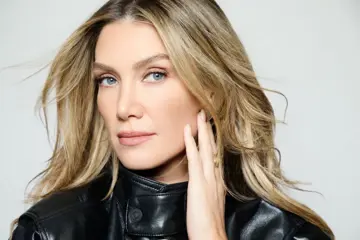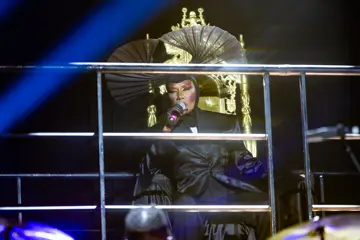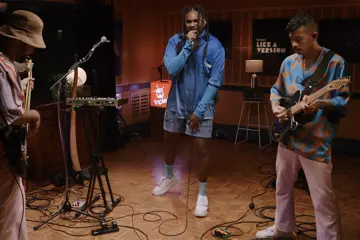When asked whether he has a dream Auslan interpreting gig that’s yet to be checked off the wishlist, Mikey Webb replies, in trademark no-bullshit fashion, “Without sounding wanky, to be honest I’m already doing it: like, the fact that I’m here [at the 2022 Australian Grand Prix] signing for the next three days – you know, The Rubens, wonderful band; Peking Duk, who I know are awesome people – I’ve done Peking Duk before, it was really good so I’m looking forward to doing that again. Having done Hamilton – hands-down highlight of the career so far. I did Midnight Oil a few weeks ago...”
So did Webb chuck in a few Peter Garrett-inspired, Frankenstein-esque dance moves for good measure? “Yeah, I did! See, I’ve got my own sort of version of dancing and stuff like that. And it’s almost Peter Garrett-like anyway, because – I dunno what it is – I feel the rhythm, I feel the beat and I just do my own little thing; always sort of have.
“But there was this guy in front of us [while Webb was interpreting the aforementioned Midnight Oil show] and he was copying the signs, and I’m going, ‘Oh, that’s pretty cool!’ And then the next day he just goes, ‘I’ve been a Midnight Oil fan for 40 years. I absolutely love them, go to all of their concerts,’ and he goes, ‘It’s the first time I felt it was in my language, it’s the first time I really understood it.’ This one deaf person – he advocated and he advocated and he advocated, and he finally got it done. So it’s that kind of stuff that makes me go, ‘Yeah, yeah, how good is this gig!?’”
“Mikey is just the best, like, the absolute best,” Adam Hyde – one half of Peking Duk and also mastermind of new solo project Keli Holiday – extols. Hyde Zooms in from LA, where he is preparing to launch his alter-ego’s debut album – the self-titled KELI – “at a venue called Winston House in Venice Beach”, where he has secured an ongoing monthly residency (‘fancy’ alert!). “And [Mikey’s] such a good guy that I think having people like that at music festivals and shows inspires so many more people to wanna do that kind of stuff,” he continues rightfully waxing lyrical, “or even just makes them think about what a person like Mikey is doing – what Auslan interpreters are doing – for the greater good. And I think that, alone, is just a huge movement that needs more awareness – more recognition – and needs more people on board.”
Don't miss a beat with our FREE daily newsletter
Recalling Webb’s strong interpreting work during Peking Duk’s recent Australian Grand Prix set, Hyde shakes his head in disbelief, eyes widening to the max, before continuing, “My Lord! He brings more energy than I think the whole crowd combined. I actually stopped the Grand Prix show and I made the whole crowd give him a big round of applause, because he was on fire! And I actually didn’t even know that he was doing the show, ‘cause the Auslan interpreters are always to the side so it’s hard to see them when you’re on the stage. But I went out the front to look at the crowd and talk to ‘em, and I saw him there just going nuts and I was like, ‘Ladies and gentlemen, please, please make some noise for the king: Mikey Webb!’ And he’s so humble... Then after the show I gave him a big hug and I told him how much I love him.”
Hyde also recently performed a Keli Holiday show at the inaugural, inclusive Groove Tunes event, which was conceptualised by Melbourne-based accessibility consultancy Tibi Access. “They had all the lyrics to every song that I was singing written out on a screen that would move along as I was singing,” he enthuses of one of the effective accessibility measures he noticed from the stage, “which I thought was awesome, too. So that’s something we’re really gonna look into moving ahead, as well... [Groove Tunes] was a fully accessible night and it really made me realise we don’t really prioritise accessibility – at all – when it comes to venues, music festivals, even restaurants, houses – anything! It really makes you think. So after that it had been something that was at the top of my mind and I’d been talking a lot with my good friend Dylan Alcott – who I’m actually gonna see in a few hours, in LA – about it and, you know, he’s someone that works so hard to make sure that spaces are more accessible for everyone and, the more I think about it, it really can just make a world of difference for anyone, ‘cause imagine how left-out it makes people feel in a world where they already feel left out?
“Those Auslan interpreters, not only are they doing a great thing but they’re also doing it damn well. And one person that I think does it incredibly well – and I’m sure anyone that’s seen him would agree – is Mikey Webb. I think he’s an absolute star in his own right, he’s an icon. You can Google him, you can see recently the poop incident that happened – a bird pooped on him,” Hyde recounts with a chuckle. “He just kept grippin’ and rippin’ and riffin’ away like he does.” Looking at Hyde’s animated expression while extolling Webb’s merits, we suspect he would never tire of bigging-up the Auslan interpreter supreme.
Since Coronavirus first struck in 2020, Webb has fronted hundreds of press conferences with Queensland authorities, also interpreting regular disaster updates (bushfires, global pandemics, floods – ugh!). “I’m sick of, like, my hearing friends especially going, ‘You’re the bad news guy. If we see you on the TV it’s like, ‘Shit, what’s going wrong?’
“I mean, that’s been really great exposure. But, again, the frustrating thing is they know that there’s a deaf community out there and, yes, it’s important they share that information, because it’s an emergency, but then the flipside is: why aren’t they doing the good news announcements and having them interpreted?... It doesn’t have to necessarily be confined to emergencies and bad news, you know? If you just had Auslan interpreters at everything, it would become the norm. And then we wouldn’t have these conversations, because it wouldn’t be so special, if that makes sense. The more we talk about it and the more we get the message out there, the more standard it becomes.
“And I don’t know if you saw the state funeral that they put on for Shane Warne, but they had interpreters there at the MCG but nothing on the live stream! And it’s like, ‘Well, how hard would that have been?’”
“Everyone deserves to be included in those moments.”
So how can we get better? “Unfortunately a lot of that stuff is an afterthought and then they forget, and it goes in the too-hard basket. Whereas if it was a forethought, it’s like, ‘Oh, yeah, that’s easy. We’ll just do that and it’s done’… It’s just awareness, you know, and it’s having the right people in the right place that just get it. I think – with any disability – if you’ve got someone that’s compassionate and understanding in what the needs are, things happen. I mean, this is the first time ever that the Grand Prix has been interpreted – like, the music and stuff’s being interpreted, all the interviews are being interpreted; how good’s that for accessibility!?”
If you’ve been lucky enough to catch Webb in full flight previously – interpreting live music shows, in particular – you’ll already be well aware that he totally embodies the vibe through his entire body while also translating the song’s lyrical meaning for the deaf community (alongside countless riveted hearing folk). Webb’s interpreting during The Jungle Giants’ performance of the title track from their ARIA Chart-topping album Love Signs, at the Queensland Music Awards earlier this year, pretty much stole the show (the band was great too, obvs). “That’s just it, ‘cause [The Jungle Giants’] vibe is so good, it’s hard not to wanna get into that vibe,” Webb humbly deflects. “And I think that’s what makes me a little bit more unique than most of the other interpreters out there, because I do get into it and I look at the crowd, and I feed off the crowd. Then if you’ve got a deaf community there, you feed off them and stuff. And I think the more the interpreter is part of the show – without being the show – the more inclusive it is.
“My expression comes from whatever they’re putting out, if that makes sense,” Webb continues. “So if they’re boring, then I’m gonna look boring – not as boring, but less engaging than I normally would be. But when you’re doing the music stuff, you’re sort of going all hell-for-leather, yeah! So it all depends on the setting – it does change.”
Although Webb always tries to obtain setlists and song lyrics in advance when interpreting a live music show, he points out, “We don’t necessarily get them, so it’s more just a case of cramming every song that you think they might spin out and hoping for the best.”
“We always supply the setlist and the lyrics to each song so they can interpret as best they can,” Hyde admits proudly. “And then adding in the vibe of dancing and getting into it; I think that’s just a huge other dimension to bring to it – all that helps.
“Peking Duk, especially, have always been two guys who really fought for having Auslan interpreters at our shows years ago, when it was kind of like, ‘Oh, do you really need that?’ It’s like, ‘Oh, yeah! it’s really important!’ Mainly because so many people already feel left out of experiences to do with music when there could be much more inclusion involved with these things.”
"It’s honestly one of the most beautiful energies I’ve been lucky enough to be around in my entire life.”
When asked what he would say to anyone who’s still not convinced that Auslan signing is essential at every single live show, Webb answers even before I’ve finished the question: “Well they clearly haven’t seen it yet. Honestly, as soon as you see it you go, ‘How good is this!?’ It actually works; it makes perfect sense.” Furthermore, the right signer can actually make watching the Auslan interpreting a highlight within the overall gig experience. “Well it can be,” Webb agrees wholeheartedly.
A request was put into Auslan Stage Left, a group that provides interpreters so deaf people can have access to theatre and the arts, specifically requesting Webb to sign at the Highway To Hell event in Perth (basically because there's actually no one else on the planet better equipped for this task).
If you haven’t already, watch the footage stat (you’re welcome):
Of this experience, Webb reflects, “That was an amazing day out. So what happened there is a girl actually used her NDIS (National Disability Insurance Scheme) funds and said, ‘I wanna go to this’ – she wanted to take her family, because she knew the whole community was going. So she used her NDIS and got us over there and then basically told the community that it was going to be on. And then I think there was, like, 100,000 people there so, yeah! It was just an amazing day and I think that was really good awareness-raising, too; it wasn’t necessarily just about the music, it was also about being part of the community and experiencing something. It was a pretty big event for Perth. So that sense of achievement is what I think is really worth highlighting, because [the deaf community] were there with their neighbours, with their community, and getting equal access to everything.”
Having been deprived of actual live music experiences over the last coupla years (due to Covid the fun sponge), we’ve definitely come to realise that attending gigs IRL is about so much more than just the musical component. Connection is a core human requirement and the shared communal moments we experience as like-minded souls, uniting and belting out mass singalongs; that warm, fuzzy sense of belonging – recently experienced during a voracious, a-cappella audience singalong of Daddy Cool’s Eagle Rock during Ross Wilson’s Bluesfest headline set! – is an elixir for the soul that simply cannot be recreated by any other means.
“Exactly, exactly,” Webb enthuses. “I mean, you go along for the music – for the spectacle – like, you know, if you think of someone like Pink who puts on an absolute display – that’s great to see, but now [the deaf community are] going, ‘Not only do I get to enjoy this, but I actually now get to understand what this song is about!’”
Hyde concurs: “Yeah, great music at a gig is great – that’s what you want, essentially – but, hey! I’ve seen some shows where the music is by no means anything amazing, but the energy is spectacular and that goes so much further. And that’s why everyone deserves to be included in those moments.”
Peking Duk played the inaugural Ability Fest – which was conceptualised by three-time Paralympic gold medalist and 14-time Grand Slam champion Dylan Alcott, in conjunction with festival experts Untitled Group – in 2018 and “the most recent one as well”, Hyde confirms. When asked to describe Ability Fest’s vibe for those among us who are yet to attend this by-all-accounts-excellent festival, he enthuses, “It’s incredible, it’s honestly one of the most beautiful energies I’ve been lucky enough to be around in my entire life. After the last one, I think me and Reuben [Styles] just like broke down with tears of happiness after the set, because you could just see it. And even if you’re not seeing it, you’re feeling it: the energy in the air of that many people being that grateful that there’s something put on for them. And not just for them, for literally everyone – that’s how simple it is, it’s like, ’This is all-inclusive,’ you know? Everyone can have a good time and that alone just brought so much happiness to so many kids that you could tell just didn’t feel like they belong so much.
“And even things like that just go such a long way in really helping certain people’s self-esteem and self-worth. And not that it should but, hey! We are all humans at the end of the day and we kind of need these things to help guide us along the way, to help us feel like we do belong to some degree. And breaking out of that outsider mentality and feeling like they’re part of something bigger – which they are! – and that it just takes something like that to show them, then I mean, like – pardon my French – that’s fuckin’ priceless. You can’t put a price tag on that; that’s pure, beautiful humanity in all its glory, you know?”
 Dylan Alcott at Ability Fest 2019
Dylan Alcott at Ability Fest 2019
So has Alcott been a regular wheelchair crowd-surfer at Peking Duk gigs over the years? “Definitely, yeah,” Hyde grins. “We met Dylan years and years ago through – I think it was at a show, I can’t pinpoint the exact moment. But I do know that the moment that we met we fell in love, because ever since then it’s been a brotherly friendship... We’ve got a lotta mutual friends and, you know, I always admired what Dylan did and always helped out wherever I could with Ability Fest. And he’s always been there for us, as well. But it’s only recently that I’ve really started thinking more and more about accessibility and how important it is, and I feel it needs more recognition.”
“Dylan Alcott’s Ability Fest came along and just sort of changed the whole landscape,” Webb concurs. “We were literally up on stage – like, on the wing, not bang in the middle – with the musicians. We had our own lights, we had our own camera putting us up onto the big screen – big enough so that anybody standing anywhere could access the interpreting – it was great! I remember the first year, Dylan was up there and he was just having an absolute ball. He was coming over and saying hello to us and some of the band was sort of coming over and singing near us. It was so good! And it was really all-inclusive.”
"They’re finally getting access to a world that they’ve been denied."
Webb’s enthusiasm while signing – and just while doing life in general, we suspect – is really contagious; he obviously loves the performance aspect of it all. “I do, yeah,” he admits. “I had a few people come up after the Q+A appearance saying, ‘Oh, you do an amazing job, rah-rah-rah,’ and I said, ‘Look, it is just a job.’ But one guy goes, ‘But, yeah, you can tell you love your job. You can tell that you care and that feeds through to the community that may not understand what the signing means, but they know that what you’re doing is important.’ And I sorta went, ‘Oh, okay’ – that sorta put me in my place a wee bit,” he confesses, with a slightly embarrassed laugh.
“I wanna make sure that the community that I live in – and the community that my family are a part of – are getting that information right there and then; just like everybody else. But, yeah, it wasn’t ‘til he sort of went, ‘No, you can tell you really do care,’ and I was like, ‘Oh, okay,’ so I think that’s why I maybe stood out a wee bit more than the others, because I’m like, ‘No, no, no, it is really important.'”
Which is probably why the demand for Webb’s services are at an all-time high; he’s “booked solid”. “The NDIS has been amazing,” he enthuses. “The deaf community now has access to stuff that they haven’t had access to before, like, they can go have [an Auslan-guided] Zoo tour – all this sort of stuff that has always been denied to them has opened up, which is great. But there’s just not enough interpreters to make it happen, unfortunately… There’s deaf people out there, you know, they’re finally getting access to a world that they’ve been denied, in general, but the pool of interpreters hasn’t grown much so we are getting busier and busier! And it’s a language to learn, so it takes years to master the idiosyncrasies of what it takes to sign effectively, so it’s not something you can just sort of pick up and do.”
But, clearly, Webb is feeling the love that arises in response to intense demand (heck, this scribe had even felt it from distant Melbourne!). “[The demand for Auslan signing at live shows] does sort of seem to be aligning and people are out there kind of going, ‘Okay, let’s give this a shot.’ So I know Frontier Touring Company [Midnight Oil’s tour promoter] – the people backstage, behind the scenes – just went, ‘Holy shit! We had no idea that the deaf people would love it this much!’ And that’s what it’s all about, that’s what’s been great: that people are now starting to go, ‘Yeah, alright, this is pretty cool.’ The momentum is getting there, slowly. I mean, stuff like [employing interpreters for] the Grand Prix I think is an amazing start, because that’s a whole lot of people out there just watching and going, ‘Oh, yeah, that makes sense!’”
Auslan interpretation at events, head to the Auslan Stage Left website
Mikey Webb also features heavily in the 2022 QMAs wrap video



